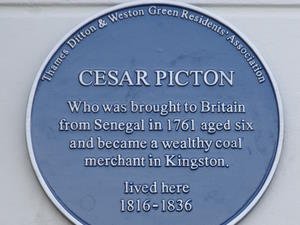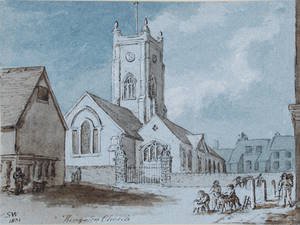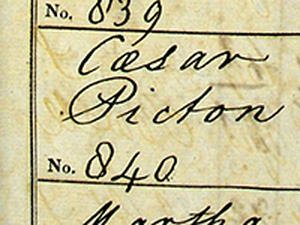 Britain has a rich and extensive multicultural past that has shaped its identity as a whole over the centuries. Surrey History Centre holds key documents that help uncover the story of Black History in the county, and some of these relate to the remarkable life of Cesar Picton (1755 to 1836). Cesar Picton was a successful businessman and coal merchant, who, for much of his life lived in Kingston, Thames Ditton and elsewhere, close to the River Thames in Surrey. However, it is important to look at Cesar's origins, which despite his later successes in life and business, involve him being forcibly brought to Britain as a child from Africa. Much of the research on Cesar's life comes from Kingston-upon-Thames Archaeological Society (KUTAS) (reference 8263/2/7).
Britain has a rich and extensive multicultural past that has shaped its identity as a whole over the centuries. Surrey History Centre holds key documents that help uncover the story of Black History in the county, and some of these relate to the remarkable life of Cesar Picton (1755 to 1836). Cesar Picton was a successful businessman and coal merchant, who, for much of his life lived in Kingston, Thames Ditton and elsewhere, close to the River Thames in Surrey. However, it is important to look at Cesar's origins, which despite his later successes in life and business, involve him being forcibly brought to Britain as a child from Africa. Much of the research on Cesar's life comes from Kingston-upon-Thames Archaeological Society (KUTAS) (reference 8263/2/7).
Cesar was born into a Muslim family in Senegal in 1755. In 1761, as a small boy with an unknown name, he was taken from Senegal and transported to Britain on Captain John Parr's ship and presented as a gift to Sir John Philipps, along with a parakeet and an African duck. We do not know if he lived in Senegal originally; he might have been taken from somewhere else. Senegal had well-established enslaved markets but we can only speculate as to whether Parr purchased the boy, and how he came to have custody of him. Cesar was christened by the Rev Dr Philipps on Sunday 6 December 1761.
In June 1762, Cesar was taken to Picton Castle where he trained in household work and was educated. He never became a servant as Sir John's only surviving son already had a servant. Cesar was treated very well by the family and was accepted as one of their own. Lady Philipps died when he was about 33, and left him the large sum of £100 in her will. He also received legacies from her daughters on their deaths.
 After he received his inheritance from Lady Philipps, the family sold Norbiton Place and the daughters moved to Hampton Court. Cesar rented a modest house in Kingston and at some point in 1788, he bought the house and assumed the surname 'Picton' from the name of the castle where he spent his early years. Intriguingly, Cesar was never active in the abolitionist movement, and was never a signatory of letters and petitions concerning the slave trade. Sir John had an interest in, and connections to, the coal industry, undoubtedly sparking Cesar's choice of business. In 1816 he bought a large cottage in Thames Ditton for the astonishing sum of £400, far above his inheritance, showing he had become a wealthy businessman.
After he received his inheritance from Lady Philipps, the family sold Norbiton Place and the daughters moved to Hampton Court. Cesar rented a modest house in Kingston and at some point in 1788, he bought the house and assumed the surname 'Picton' from the name of the castle where he spent his early years. Intriguingly, Cesar was never active in the abolitionist movement, and was never a signatory of letters and petitions concerning the slave trade. Sir John had an interest in, and connections to, the coal industry, undoubtedly sparking Cesar's choice of business. In 1816 he bought a large cottage in Thames Ditton for the astonishing sum of £400, far above his inheritance, showing he had become a wealthy businessman.
 Cesar Picton died on 10 June 1836, aged 81, a wealthy and respected man, and was buried in All Saint's Church in Kingston. In the will of the wealthy William Porter in 1807, he is described as 'Caesar Picton of Tullworth, gentleman', suggesting his rise up the social ladder. Picton's own will (transcribed in a KUTAS study, reference 8263/2/7) features prominent names such as his goddaughter, Sarah Lock Pinner, who married William Pamphillon, a mayor of Kingston in the 1850s, and mentions expensive items such as a tortoiseshell tea chest with a silver caddy-spoon and a horse and chaise. His funeral was modest, with no more than 8 mourners, but his coffin required 10 bearers instead of the usual 4 to 6 (reference KX.21 at Kingston History Centre).
Cesar Picton died on 10 June 1836, aged 81, a wealthy and respected man, and was buried in All Saint's Church in Kingston. In the will of the wealthy William Porter in 1807, he is described as 'Caesar Picton of Tullworth, gentleman', suggesting his rise up the social ladder. Picton's own will (transcribed in a KUTAS study, reference 8263/2/7) features prominent names such as his goddaughter, Sarah Lock Pinner, who married William Pamphillon, a mayor of Kingston in the 1850s, and mentions expensive items such as a tortoiseshell tea chest with a silver caddy-spoon and a horse and chaise. His funeral was modest, with no more than 8 mourners, but his coffin required 10 bearers instead of the usual 4 to 6 (reference KX.21 at Kingston History Centre).
Read more about Cesar Picton's life on the Exploring Surrey's Past website.
Sources
- Deeds of Picton House, Thames Ditton, 1709 to 1841 (reference 8263/1/1-15)
- Press cutting: Surrey Comet, 2 October 1976 (reference 8263/2/6)
- Record of inquiries by Joan Wakeford into funeral arrangements of Cesar Picton (reference 8263/2/7)
- Kingston-upon-Thames Archaeological Society, 'Picton House and the People Connected with It', Occasional Papers 2 (1979) (reference 8263/2/7)
- Ancestry
- Historic England: Picton House
- Dabydeen, Gilmore & Jones, The Oxford Companion to Black British History (Oxford: Oxford University Press, 2007)
- Elmbridge Museum
- Findmypast
- Kingston History Centre
Images
Select image to view a larger version.

